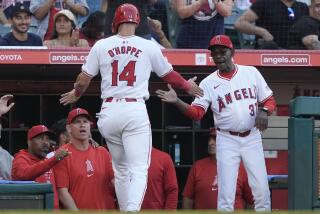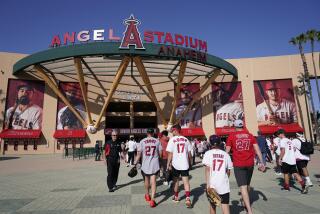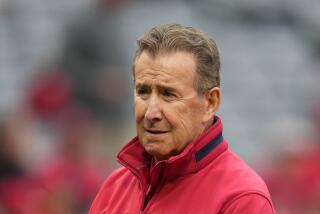Trading Davis Another Foolish Angel Decision
The Angels finished only six games behind the Seattle Mariners in the American League West last year. Injuries to Chuck Finley and Todd Greene took a toll, as did the Tony Phillips drug incident, but nothing was more costly than the cost-cutting decision to trade Chili Davis before the season.
The shootout in the West, it can be said, was decided by the designated hitters.
Seattle had baseball’s best in Edgar Martinez. The Angels turned to over-the-hill Eddie Murray, and it went downhill from there.
They ultimately employed 16 players in the DH role, and those not-so-sweet 16 produced a meager 15 home runs and 62 runs batted in. Davis, due $3.8 million in the final year of a three-year, $11.4-million contract and coming off a season of 28 homers and 95 RBIs with the Angels in ‘96, had been traded to the Kansas City Royals for a past-his-prime Mark Gubicza and Mike Bovee, who would combine for an 0-1 record in five games. Gubicza watched the race from the disabled list and is now retired.
Davis has moved on to a two-year (with an option), $9.8-million contract with the New York Yankees, having produced one of his best seasons in 1997--hitting a career high 30 homers to double the Angels’ DH total and driving in 90 runs with a .279 batting average.
“After I left and saw the changes they made, I couldn’t figure out what it was all about,” Davis said of the Angels decision to trade him to Kansas City and create the DH void of ‘97, a void they are attempting to fill in ’98 with the big body of Cecil Fielder, signed for a comparatively inexpensive $2.8 million.
Davis, sitting in the Yankees’ spring clubhouse, chose his words carefully. He said he can’t be angry or bitter at the Angels, with whom he spent seven years over two tours. If they made an initial mistake by playing the salary card and allowed him to leave as a free agent and join the Minnesota Twins in 1991, they also took him back in 1993, giving him the chance to reestablish his career in the U.S. at a time when he seemed headed to Japan after a down year in Minnesota.
“How can I be mad?” he said.
However. . . .
“The Angels are fortunate to have a lot of good young players, and you have to give the farm system credit, but they just never seem to put the right people with it to enhance that young talent,” he said.
“It’s a great place to play, but you don’t see a lot of veteran free agents wanting to go there anymore because the Angels basically try to do it as inexpensively as they can.
“I mean, the worst thing that happened was that Gene Autry got old. He had a passion and love for the game like George Steinbrenner does. Then Jackie [Autry] took over and she has no love for the game. She was only interested in building up the team’s equity.
“Disney has done a lot of positives, like beautifying the park and signing the young players to long-term contracts, but it’s still a business. I mean, the business aspect has to play a part, but there has to be a passion, the motivation has to be to win. If you don’t win, if you don’t put a product on the field, you lose both ways.”
He referred to the economics and the standings.
Of course, the Angels spent significantly under Gene Autry with not a lot to show for it. Too much of the spending went to too many veteran free agents--and in a few cases not enough of the spending. The Autry Angels thought they could replace Nolan Ryan with two 8-and-7 pitchers. The Disney Angels thought they could replace Chili Davis with Eddie Murray and a cast of thousands. Dollars and sense haven’t always shared a dance card in Anaheim.
Davis is 38 and clearly still productive--if ’97 is the measurement. He left Kansas City as a free agent because he wanted the chance to win. The Yankee contract, he said, is probably his last. He knows it’s a tough and demanding environment. He thought about it, but concluded, “If you perform well, if you do your job, the rest takes care of itself. There’s a lot more advantages than disadvantages. New York is the mecca of the U.S. It would be nice to leave the game with a team that wins, but there’s more to it.
“When we won in Minnesota [1991], I wasn’t regarded as the player who led the team. That was Kirby Puckett’s team or Jack Morris’ team.
“I don’t mean to sound envious, and I’m not obsessed by it. I’m not into the notoriety, but the opportunities off the field and post-career are 10 times stronger in New York than anywhere else.”
And the owner is more apt to provide the missing piece, as Steinbrenner did with the acquisition of Chuck Knoblauch after Davis had signed.
“That made it all the better,” said Davis, who reflected and added, “it was an interesting off-season. I was curious to see if the Angels came after me because they needed a DH. I’m not sure I’d have gone back, but the opportunity never presented itself. They made a business decision, and I chose the opportunity to win.”
PLAYOFF CHANGE
Curiously, baseball’s playoff teams have not always found it to be home sweet home in October, but owners did the right thing last week in adopting a format change recommended by their general managers, approved by the players’ union and designed to give the teams with the best records during the regular season the home-field advantage in the playoffs.
Teams will be seeded according to their won-lost record by league and will play a 2-2-1 format in the division series rather than 2-3, as in the previous three years. The teams with the higher winning percentages will host Games 1, 2 and 5, if necessary, except for wild-card teams.
The division winner with the best record will play the wild-card team unless the teams are in the same division. In that case, the division winner with the best record will play the division winner with the worst.
Through both the division series and the league championship series, the team with the best record, providing it is not a wild-card team, will have the home-field advantage--Games 1, 2, 6 and 7 in the championship series. The World Series will continue to alternate home-field advantage between the leagues each year.
“Maybe we overemphasize the home-field advantage, but the perception is that it’s important and we’re making an effort to put more emphasis on the regular-season record,” said Boston Red Sox CEO John Harrington, chairman of the schedule-format committee.
Interestingly, of the 114 games played in the league championship series during the last 10 years, the home team won 57 and the road team won 57.
Under the just-discarded division series format, in which the team with the best record played the first two games on the road and the last three at home (two of which might not have been necessary), only five of 12 teams with the alleged home-field advantage advanced. Of 44 division series games played in three years of that format, the home team won 24 and the road team 20.
DYKSTRA’S DECISION
Take away any sentiment and the Philadelphia Phillies were delighted on Tuesday when Lenny Dykstra--sidelined all of last year--all but announced that his painful comeback attempt had failed because of recurring back problems.
The reality is that the Phillies are trying to rebuild, had traded for Doug Glanville to be their center fielder and leadoff hitter (Glanville had gone on to win the job, batting .353 compared to Dykstra’s .095) and were concerned that Dykstra would have become a clubhouse distraction as a reserve, since only a week earlier he had engaged in a screaming match with Manager Terry Francona and General Manager Ed Wade, insisting he was healthy. Dykstra apologized for that and said of his decision to shelve the comeback for a time--and probably for good:
“The organization made it as easy on me as they could. They pretty much let me go on my own schedule, but there comes a point where you realize you just can’t do it. I’ve been masking a lot of things, trying to fool a lot of people. But I felt I owed it to everybody not to try to lie or fake anybody out.”
The reality is that this allows the Phillies to save $4.8 million in salary and the buyout of his 1999 option through insurance, besides eliminating the possibility he could guarantee that $6-million option with 500 plate appearances this season.
NEW LOOK
Chicago Cub Manager Jim Riggleman has switched Mark Grace and Sammy Sosa in the batting order, putting Grace fourth and Sosa third, which keeps Sosa from batting in front of Henry Rodriguez--not a bad idea since they were first and third in the National League in strikeouts last year.
“If you’re going to get power, you’re going to get strikeouts,” Riggleman said. “If you have two guys like that in the lineup, chances are that if one of them is struggling and striking out, the odds are the other one won’t be struggling. I think we have a nice mix there.”
THINK BLUE?
Seattle Mariner Manager Lou Piniella stressed again the other day that there is nothing new on the Randy Johnson trade front--”It’s like the Iraq crises, it came and went”--but another Johnson blow up (“It’s hard for me to be here, and I don’t want to be here because it’s affecting my performance”) and the approval of Rupert Murdoch as Dodger owner has sparked new speculation that Fox may be looking to make a splash and would be interested in a Johnson trade. The Dodgers wouldn’t listen when the Mariners talked about Ismael Valdes and Wilton Guerrero. Now the Mariners are rumored to be looking at Darren Dreifort. First, however, Fox is moving to sign Mike Piazza.
ON THE VERGE
Two former L.A.-area collegians are taking their spring roster and starting bids down to the 11th hour.
Former Pepperdine center fielder Ryan Christenson, who was a 10th-round selection of the Oakland A’s in 1995 and missed part of that season because of a shoulder problem before rocketing through the Oakland system last year, has been impressive enough this spring that the A’s traded veteran Ernie Young to Kansas City last week, leaving only Christenson and Jason McDonald to battle for the job in center field.
Former UCLA left-hander Jim Parque, only nine months removed from last June’s draft and with only one pro season under his belt (he was a combined 8-2 in Class A and triple A), remains in the hunt for the Chicago White Sox’s fifth starting spot.
Parque was a 50th-round draft choice of the Dodgers when he graduated from Crescenta Valley High School, but he says, “I knew I wasn’t mentally or physically ready then, but I wanted to turn pro so bad after last year that I would have signed for a Snickers bar.”
He got cash instead of calories, receiving an estimated bonus of $400,000 as the 46th player selected in the amateur draft.
More to Read
Go beyond the scoreboard
Get the latest on L.A.'s teams in the daily Sports Report newsletter.
You may occasionally receive promotional content from the Los Angeles Times.






